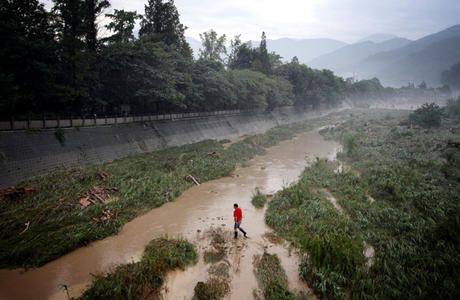This article is from a student at Tenzer Learning Center in New York, NY. Tenzer participated in a series of visits with Pulitzer Center journalists leading up the High School News Literacy Summit at Baruch College in Manhattan.
Water pollution is every year increasing. This causes a water shortage that is both a national and international issue. It will likely affect less developed countries the most as their population will see the greatest increases, and many are located in water-scarce areas already.
In 1910 when my grandfather was young, our hometown river Min Jiang, located in Fu Jiang, China, was clear, limpid, and lucid. You could see fish swimming and you could see anything in the river. At that time the river water tasted pure and water was a precious mineral resource. Water contains natural ingredients that are beneficial to the human body. At that time, however, China began the period of industrial development. The government built a factory, oil refineries, chemical plants and other heavy industry. These industries pumped industrial waste and raw sewage directly in to the river.
In 1960, when my father was young, Min Jiang River was black and dead. Pollution of river water affects us in many ways. The town people drank the dirty water. The water failed to meet drinking water standards and people got nausea, diarrhea, vomiting, and other symptoms. Then people dug wells to survive. According to Ms .Wu Xia Feng, from the government environment center, an investigation found that the river contained major pollutants. The pollutants include 2.73% nitrogen and 8.22% phosphorus. This is above average acceptable levels.
How did the river come back to clean? In 2000, the government built a tunnel to pump fresh water into the river. Only two months later, the water was cleaner. Chen Tian Ming, a construction engineer for the Construction Engineering Corporation, said, "To clean up the river, the government spent 1 billion yuan, and I am excited and very honored to join this project." Ms. Feng said that, "In China two thirds of river are polluted." She also said, "One billion people in the world lack access to safe drinking water, and 2.2 million people die each year from consumption of contaminated water. 9550 children alone die everyday." She wants to tell people to treasure the water.
My grandfather Lin Ling Qi, 101, is a retired farmer. He was lying on the chair to tell his story. He said that environmental awareness is still relatively low. He is glad to see the river go from dirty to clean again. This is important news for people everywhere who in their lifetime have seen their water, their rivers, get polluted from industrialization.
